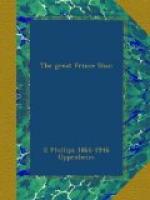She rose to her feet and laid her hands upon his shoulders.
“Nigel,” she whispered, “I cannot answer you. I cannot say what you would like me to say, although, on the other hand, there is no surety of what you seem to fear. I am going to bed. I am very tired.”
A feeble shaft of sunlight stole into the room, flickered and passed away, then suddenly reappeared. Nigel turned and opened the door, and she passed out, curiously silent and absorbed. He looked after her, perplexed and worried. Suddenly a strangely commonplace, yet—in the silence of the house and the great hall—an almost dramatic sound startled him. The front doorbell rang sharply. After a moment’s hesitation, he hurried to it himself. Karschoff stood upon the steps, still in his evening clothes, his face a little drawn and haggard in the bright light.
“I could not resist coming in, Nigel,” he said. “I saw the light in the study from outside. Is there any definite news?”
Nigel drew him inside.
“There are indications,” he replied cautiously, “that the present danger is passing.”
Karschoff nodded.
“I gathered so from Naida,” he admitted. “Prince Shan, though, is the pivot upon which the whole thing turns. You have heard nothing final from him?”
“Nothing! Tell me, was any one arrested at the Albert Hall?”
“No one. The murdered man, as I suppose you have heard, was Sen Lu, one of the Prince’s secretaries.”
“The whole thing seems strange,” Nigel remarked. “Do you suppose Prince Shan knew that an attempt upon his life was likely to-night?”
Karschoff shook his head doubtfully.
“It is difficult to say. These Orientals contrive to surround themselves with such an atmosphere of mystery. But from what I know of Prince Shan,” he went on, “I do not think that he is one to shirk danger—even from the assassin’s dagger.”
A milk cart drew up with a clatter outside. There was the sound of the area gate being opened. Karschoff put on his hat. He looked Nigel in the face.
“Maggie,” he began—
Nigel nodded understandingly as he threw open the front door.
“I’ll tell you about it to-morrow,” he promised, “or rather later on to-day. She’s a little overwrought. Otherwise—there’s nothing.”
Karschoff turned away with a sigh of relief.
“I am glad,” he said. “Prince Shan is the soul of honour according to his own standard, but these Orientals—one never knows. I am glad, Nigel.”
CHAPTER XXIII
In his spacious reception room, with its blue walls, the high vases of flowers, the faint odour of incense, its indefinable ascetic charm, Prince Shan sat in his high-backed chair whilst Li Wen, his trusted secretary talked. Li Wen was very eloquent. His tone was never raised, he never forgot that he was speaking to a being of a superior world. He had a great deal to say, however, and he was eager to say it. Prince Shan, as he listened, smoked a long cigarette in a yellow tube. He wore a ring in which was set an uncut green stone on the fourth finger of his left hand. Although the hour was barely nine o’clock, he was shaved and dressed as though for a visit of ceremony. He listened to Li Wen gravely and critically.




